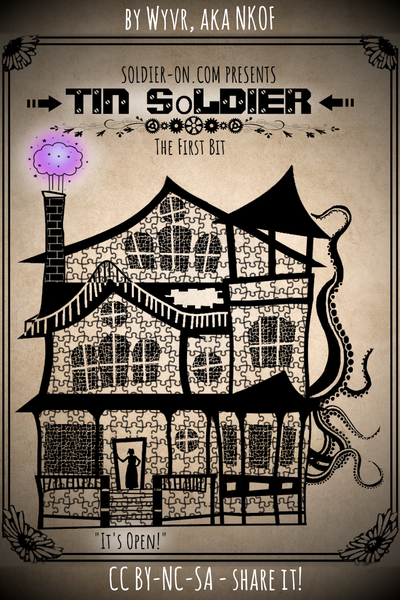Illustration: Mordecai’s tarot card, The Musician, based on The Emperor. He is playing ’cello on a street-corner, eyes closed.
[PSI-4] (That's a content warning, New Readers. This is a downer beginning, but nobody is suicidal! Ha-ha, yet!)
The red man was carrying the green child and running. The boy was swaddled in a dark cloth coat. The blood did not show, but the slow seep of warmth was steadily growing.
The chaos was behind them. If they were fast and quiet, they would not be stopped. Even if it were someone meaning to help and not question, they must not stop. The only help was before them, and they must not waste time explaining.
If the police were to stop them, that might mean a cell. That would be death for the child.
The boy was crying, which drew glances, but the man allowed it. When it seemed the low, sawing noises would cease, he clutched the dark bundle against him and pleaded, “Don’t stop crying. Don’t stop crying.”
When they passed a trash can, the man would shift his burden and rifle through it. In such a manner he had found two soup cans, a bent brass tack and a broken link of chain. It was not good.
They were passing a wrought iron fence, chest-height, with jagged arrow points. Beside the gate on either side was a golden final, shaped like an eagle with wings outstretched. The man gave a cry and snatched at it with his bare hand, as if it might perhaps be loose. It wouldn't be gold, it might only be painted iron, but they would need the iron. It might even be brass.
There were some loose cobbles in the gutter at the edge of the street. The man chose a large one and, juggling the child against one hip, brought it to bear against the eagle’s back. The metal rang, but did not dent or give. With tear-streaked desperation, he struck the eagle again and again.
“Move!” he hissed, too short of breath to snarl.
“Oi, magician!” a man called. “What are you doing there?”
Damn it!
He dropped the stone, bundled the child against him, and ran.
The boy had stopped crying.
The streets had grown narrower, more circuitous, more familiar. The lamps were fewer. The decorative municipal trash cans, which resisted theft and access, were nonexistent. There was an occasional dumpster — but he didn’t have time for those! The alleyways were known and numbered, between boarded storefronts and cheap, converted gothic-style houses. Five more. Four more.
Home was near. There was always some metal at home, though never much and never for long. Hyacinth was near. Help and safety.
But the boy had stopped crying and none of that mattered.
He stopped, tottering, and leaned against the crumbling brick façade of a bombed-out building. His breath was tearing in his chest. He thought something inside of him had sprung, but that didn’t matter either.
He peeled back the folds of the coat, revealing the child’s face, pinched and pale. He was only green in patches. The blood had dyed his skin, as it had reddened and matted his hair. Head wounds bled a lot, and the man had seen terrifying gashes put right with just a little mending and rest…
But here, beneath the running red, was the white of bone, and it was shattered.
“Cry,” he said.
Silence. He could not hear breathing over the sound of his own, and the child’s tense expression was going slack.
“Cry!”
But nothing. Such a roaring, loud sound of nothing.
He held the precious, fragile parcel away from him, turned it in both hands, and shook it. The child’s ruined head bobbled on a flower-stem neck.
“Damn you! I said cry!”
A low, miserable sound rose from the bloodied mouth. One hand came up, green but stained and pale and shaking.
“It’s all right,” the man said. He clutched the hand, and he pressed it to his lips. “It’s all right.” He bundled the body against him and ran on.
———
The house was narrow, tall, and jagged.
The roof was naked tar paper, with only a few errant shingles left on in scabrous patches like some kind of disease. A large hole had been covered with a tarp, which was weighted on the edges with loose brick and stones. It billowed in the wind.
The house itself, and the battered fence that separated the yard from the street, was of mortared construction, with varied components. Red brick here, brown here, flagstone, brownstone, cobblestone. There was much evidence of damage and patching, and very little paint.
Some small forgotten windows were broken and boarded, but most had been reglazed with lead and scrap glass and putty. Nails were too precious a commodity to be wasted on boards, and the daily shocks that knocked out glass and shattered walls had long since ceased.
A wooden sign affixed to the brick wall beside the front window offered rooms to let, and a smaller sign beneath this rescinded the offer from people with dogs, or perhaps simply dogs alone.
The courtyard, pressed small by close-knit buildings and wide street, was full of scrap. Mostly torn and splintered wood that would be burned in the brick oven and terracotta braziers for warmth. There was some loose brick heaped in little piles, meant for further repairs, and some glass which would likewise be pressed into service as needed. A single sack of dry cement sat forlornly against a slumped brick wall, awaiting a trowel that lasted long enough to be put to proper use.
Paper trash, constant and ephemeral, drifted in and out at the whim of the breeze. Bird droppings, though unavoidable, were not of squalid amount. Rats were similarly sparse. The local cats kept these populations in check, as well as the local humans — who were not too picky about what went into the soup. An occasional cat or dog still found its way into the pot as well, as once had the elephants from the zoo.
There was no gate. A largish board, leaned at a gentle angle and weighted with rocks, served the purpose. A scrap of garish poster, showing a laughing dancer with a flute of champagne, still clung to one side.
Mordecai planted his foot in her face and trampled over her. He was gasping and could only manage a stagger. It would not have been wise, or even possible, to run through the yard. He was still going too fast for it, and he tripped and scraped open a knee before he made the steps and clambered up to the door.
The doorknob!
He reached for it with feverish hope, but found it gone. A string had been threaded through the resulting hole, through a neighbouring hole in the door frame, and tied in a limp little bow.
He made a low moan, he could not manage words, and sank down to his knees. The child slid from his arms, into his lap. He couldn’t reach up and undo the string. He had no strength for it. He had no mind for it.
There was no cord to pull, no buzzer or bell to ring.
Hy…
It was a breath. Too soft.
Cin… Hya…
Please help me, I’m going to die out here!
No, he wasn’t going to die. Or if he was, that part didn’t matter.
“Hyacinth!”
Ah.
He felt that. Like the pluck of a high string. He was broken, or breaking. It hurt to breathe.
He heard her shoes on the tile floor. Rubber soles, glued and stitched, soft things. Quiet things, they whispered on the tile, staccato fast. She was running.
She broke the string.
Oh, I could’ve done that, he thought faintly.
“Mordecai, what in the hell?” she said. She had been working in the basement, leading a new window pane. Faint yellow wisps were already escaping the elastic that tied back her hair, but everything else about her was trim, tucked and plain. Her skin was tanned and had a tendency to pinken, but she had no colour. Her magic was learned.
She lifted the dark amber goggles up to her forehead and swiped at a smudge on her nose with a gloved hand.
It was hard for him to speak. He brushed back the coat and he lifted the child.
She swore, then she snatched up the boy and disappeared within.











Comments (0)
See all